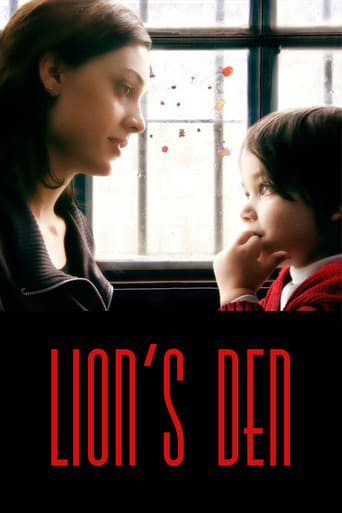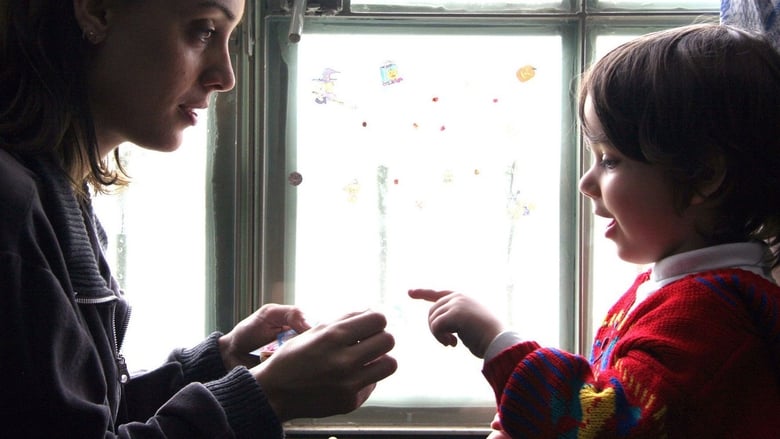

Lion's Den (2008)
Julia, a 25 year-old university student, two weeks pregnant, with no criminal record, is sent to prison. Julia murdered the father of her child. This story addresses maternity, jail and Justice; confinement, guilt and solitude; but above all it deals with Julia and her son, Tomas, born inside an Argentinean prison.
Watch Trailer
Cast
Reviews
Must See Movie...
As Good As It Gets
A movie that not only functions as a solid scarefest but a razor-sharp satire.
Blistering performances.
70 years of movie going and with seeing 'Lion's Den' I've experienced the most remarkable film of my life. The writers delivered a great story which then had life breathed into it by sensitized actors, both writers and actors efforts directed with enormous creative humanity by Pablo Trabero. I saw no artifice and after watching some of the movie allowed myself a mili-second of time to think of 'Lion's Den' as being a documentary before forgetting any of that and just became an involved, rapt viewer. Deeply touching. Deeply human. This review does not contain enough lines - the minimum length for reviews is 10 lines of text. There!
Julia wakes one day only to find herself bruised, something she doesn't seem to notice. Her hands show blood that she washes out during her morning shower routine. At work, she appears distant. That night, as she returns home, the impact of what had happened in her apartment shocks her because she finds her live-in lover, Nahuel, dead. Ramiro, who was also involved sexually with Nahuel is wounded.For reasons that aren't explained, we never get to know the reason behind the murder. It is never made clear whether Julia was the killer, although everything conspires to land her in jail. Ramiro has survived and he is telling a different story that seems to be the opposite of what Julia confesses to the authorities in charge. We don't get to know the motive for the crime.What follows is an account of Julia's life in prison. The first thing the guards find out is that she is pregnant. Instead of going to the regular ward for criminals, Julia is taken to the maternity section where women with children are allowed to keep them until they turn four years of age. Julia begins to see what life is going to be now behind bars. It isn't a pretty sight. Luckily, Marta, another convict with two children comes to her rescue one day when Julia is assaulted in the communal showers. Marta, also, wants a piece of her new friend, but she is kinder.Julia's mother, Sofia, arrives from France, where evidently she has been living for some time. The relations between mother and daughter aren't exactly the best. Julia gives birth to Tomas. Not having any guidance, Julia is awkward in the way a baby has to be fed, among other things. Sofia helps bringing clothes and other things for the baby. The lawyer that has been trying to defend Julia is not exactly effective in presenting her case. To make matters worse, the case is brought to a formal trial and Ramiro lies about the crime, which allows him to leave the prison.Pablo Trapero is an interesting director. His previous films reveal he is an artist that loves to tackle themes no other men would. Mr. Trapero co-wrote the screenplay of this complex story that is more than a 'women behind bars' story. He makes a case about how strange justice works for someone like Julia, a woman caught in a web of red tape and because of her status as a female in a macho dominated society.The best thing in the film is Martina Gusman, who is married to the director and who has served as producer for all of her husband's films. Her Julia is one of the best performances in the Argentine cinema, bar none. She is an actress to consider, even though she has only appeared in 'Nacido y criado' before. Elly Medeiros plays Sofia, the distant mother that suddenly has to face her daughter's imprisonment at close range. Laura Garcia and Rodrigo Santoro are seen as Marta and Rodrigo, the other two main characters of this harrowing account about a woman entangled in a web where she can't escape.
The women in prison genre is often associated with cat-calling girl-fights and the guilty pleasure to the audience of women talking dirty and acting, actions supposed to be the purview of Tarzan aping men. Trapero's Leonera offers something else, an inquisition into how a life behind bars can change the human psyche and create a bond between a child and a mother. Echoing the early movies of the French New Wave that placed the gyneco-issues front and center and the point of view objectivity of the Dardenne Brothers, it is a worthy addition to what can be called the post-modern woman's picture. What is it like to give birth to your child behind bars? To have your child taken away, the rejoinder and enjoinder are all explored. With a wonderful performance by Martina Gusman, it is another worthy canon to 21st Century Argentine cinema.
Where to start with "Leonera", a tale of unexplainable love, strength and growth? Well, I could say that to make a movie as powerful as this one, would require not only love for cinema, but strength and growth acquired with the years? Pablo Trapero is in love with his work; he lives with it as his characters live with their stories: fighting.Just as Zapa fought for a place in the police force and had it tough in "El Bonaerense", Julia Zárate has to fight for respect when she arrives to a cell in a prison, and later on for her son, Tomás. The 'love' factor may not be the best way of expressing the power of "Leonera", but it's certainly a good one because it's a characteristic that's present throughout the entire ride and that you might not take so much into account. Trapero is so very in love with his wife Martina Gusmán too. She plays the main role of Julia and she does it with tremendous expertise and maturity, appearing younger than she really is; being strong when she must and completely defenseless when the circumstances requires. Yes, Gusmán is the driving force of "Leonera", but it's fair to say that it wouldn't be the same if the camera didn't love her like it does. Here, as in "Familia Rodante" inside the van (and also in "El bonaerense", though with not the same impact), the director's collaboration with cinematographer Guillermo Nieto is crucial. The camera's focus on Julia is constant, with close-ups that sometimes are even repulsive, when we see her in her worst state, as she goes through the most dreadful experiences. I could tell you these experiences one by one, but it would be pointless. When I wrote about "Familia Rodante" I said: "Trapero directs so close to reality that we could be watching a documentary". This is a compliment, because to move the viewer there's nothing more effective than reality. If Julia goes through all these things is because she must have done something, because reality involves people, and in the end is always going to be about people. More than ever, Trapero's eye for reality makes the difference of what's going on in Argentina with the film industry today. The script of "Leonera", which he wrote with his collaborators, is sharp and harsh; with a strong vocabulary that resounds through the wall of this ward of this prison, another main character as, in the best Frank Darabont tradition, the ward in "The Green Mile" and the whole prison in "The Shawshank Redemptions".In the objective of representing reality that no other national filmmaker today, Trapero observes the prison during the film, presenting shots of the installations from different angles; during the day, during the night, while it's raining. This way, we can identify with Julia's situation, without having to defend her position, something Trapero never demands us to do. There's one sequence in which Julia's baby starts crying and the camera goes through the windows of every cell, where every baby in the prison starts crying. The crying becomes so loud that we want to cover our ears. There are villains and best friends in "Leonera", because they have to be. There must be someone who wants to keep Julia away from her son, and there has to be someone who will help her with her problems inside the prison. In Julia's relationship with these characters, if you try to see it that way, what rules is, going back to the beginning, love.Though it sounds like a cliché, and there are many other reasons (and I tried to develop some) to explain Trapero's latest film's magical quality, we can't deny that there's nothing like motherly love. Trapero knows it and he makes us feel it, surrounding us with real people (you have to watch this; you'll see really real people).Renowned critics say that we can't talk about New Argentine Cinema anymore, that we have to say Argentine Cinema. You can call it whatever you want, I'll just tell you there are incredible films like "Leonera" being made and you shouldn't miss them, beyond every prejudice you could have.


